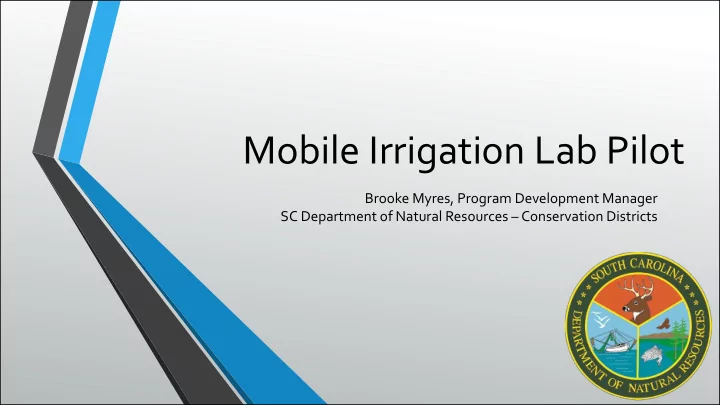

Mobile Irrigation Lab Pilot Brooke Myres, Program Development Manager SC Department of Natural Resources – Conservation Districts
Mobile Irrigation Lab • Auditing service for irrigation systems • Identifies areas of over/underwatering due to malfunction or misuse • Suggests energy savings opportunities • Recommends upgrades or operational changes
Mobile Irrigation Lab • Performed 3 to 5 years after installed or upon a new landowner • Meant to test overall ability of system to evenly distribute water and measure percentage of application loss • Gives potential and actual water savings based on the crops being grown • Lists obvious clogs, leaks, and performance issues • Suggests efficient end-gun use to reduce overlap or eliminate irrigation of non- crop sections
Project Initiation • Realized it was a lacking conservation opportunity in the state • Educational presentations at partnership events • Stakeholder and partner meetings • Getting close to taking off!
Project Purpose • Proactive approach to water conservation • Assess potential water and energy savings of a Mobile Irrigation Lab Service • Educate public and partners on the program potential • Develop a plan for a permanent, funded Mobile Irrigation Lab Service
Project Plan – Year 1 • Host 2 educational outreach programs for landowners • Identify pilot study participants (24) • EQIP and non-EQIP retrofit funded • Perform pre-audits, retrofits, and post-audits
Project Plan – Year 2 • Perform remaining pre-audits, retrofits, and post-audits • Begin analyzing pre- and post-audit data
Project Plan – Year 3 • Finish data analysis • Host 2 meetings to share results to the public and partners • Promote a state funded Mobile Irrigation Lab Service • Develop a plan to approach state legislators to support service
Expected Results and Benefits • Conserve • Billions of gallons of water • Energy • Reduce • Chemical input • Leaching of nutrients • Soil erosion • Increase • Crop yields • Growers bottom line
Project Partners • Aiken Soil and Water Conservation District • USDA Natural Resources Conservation Service • SC Department of Natural Resources • Resource Conservation Partners • Clemson University • Local Soil and Water Conservation Districts • SC Department of Agriculture • SC Farm Bureau • Ag South
Questions?! Photo taken by Taylor Main, SCDNR • Does your state have a similar program? • Have you been involved with getting a similar program off the ground? • Does your state’s program have an energy savings component? How is it measured?
Recommend
More recommend